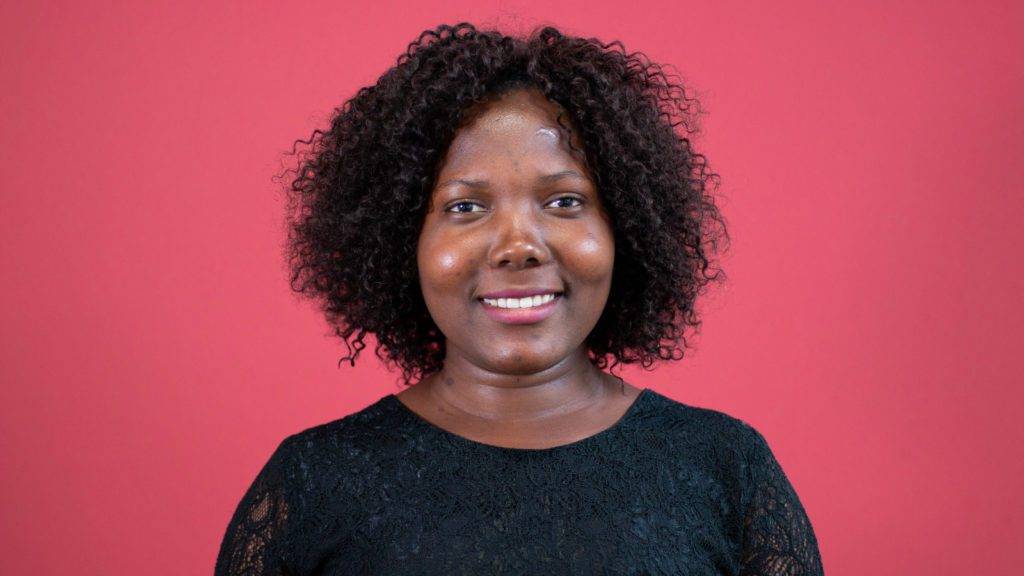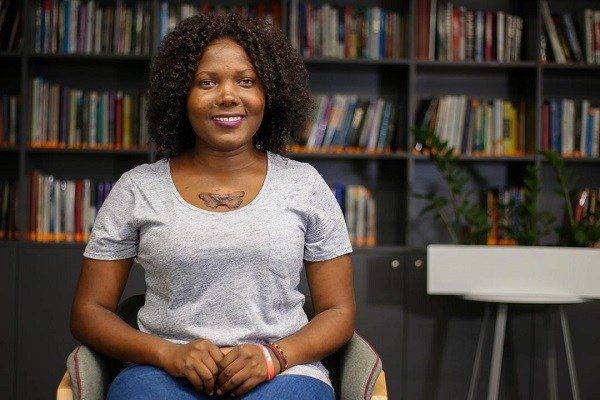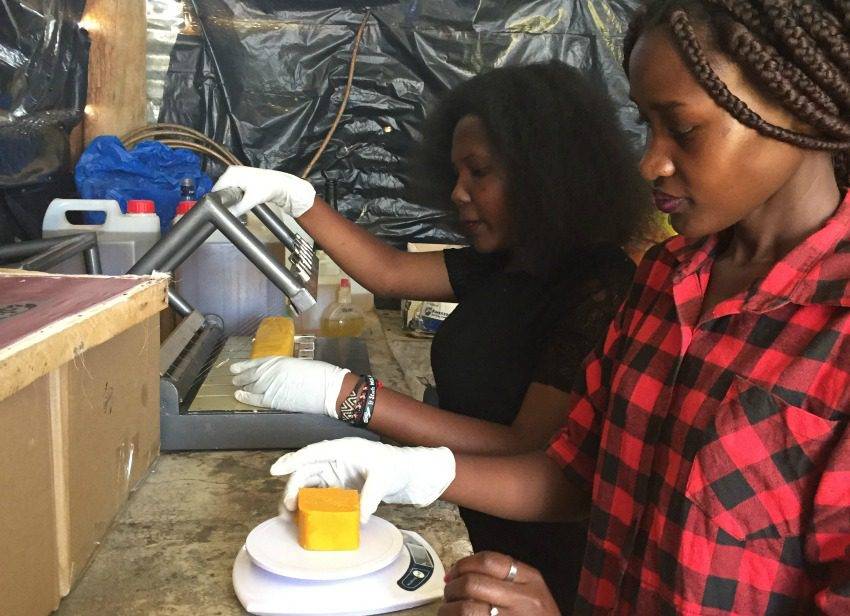Poor Finances Kept Her From Fulfilling Her College Dreams – But Now She’s Touching Lives Home & Abroad

This Ugandan entrepreneur was raised in an orphanage because her single mom couldn’t take care of her. Then, she dropped out of college because she couldn’t keep up with the fees. But now she runs a company whose product might just keep your health intact on your next trip to Uganda!
Joan Nalubega had always taken quite a liking to the idea of obtaining a college degree but it always seemed out of reach, and at times, just beyond her grasp.
At only five years of age, her family’s financial struggles meant that she had to move into an orphanage in Uganda’s Mpigi District which became the home she knew until she turned 10.
Joan was born into a poor family that had only a single parent toiling to keep mouths fed and make ends meet. And moving into the Kankobe Children’s Home became necessary when it became obvious that her mother could no longer take care of her (Joan) and her siblings.
Not to say her time at the orphanage was steeped in pleasant moments but it did see her grow into a resourceful child that was quite willing to improvise to solve problems and quite interested in learning from day-to-day experiences.

The time at the children’s shelter did also allow her a shot at her dreams of going to university and earning a degree, however short-lived the dream was. Through the sponsorship of a German non-profit organisation, Joan Nalubega and several other kids were supported through high school.
But the young girl was even thirsty for more and high school wasn’t as high as the bar went for her. She was determined to further all the way to college and it seemed her dreams were finally coming true when her hard work paid off and Uganda’s Makerere University threw its doors open to her to study her preferred course, Chemistry, on account of her impressive grades.
And then came the anti-climactic plot twist. As stated earlier, Joan Nalubega was sponsored through high school by a German nonprofit run by a former volunteer at the children’s home that sheltered her during parts of her childhood. But now that the conversation had gone as far as college, it was always going to be a big ask on the part of the sponsor who could only afford 60 percent of her tuition.
“I was excited to go to university, I saw myself learning a lot of things, being able to invent things,” Nalubega said. But that dream was always going to be quite a reach. Actually, she did accept the admission and got started at the university, and she did try to make it work by taking up jobs on the side to augment the efforts of the sponsor.
But all the effort was just not enough. Without significant financial support, it was only a matter of time before she had to drop out of school – a very painful time in her life as she reckons.
Joan Nalubega’s story is hardly an isolated case – it’s the story of many of the poor or orphaned kids sponsored by German non-profit, Jangu e.V; an organisation founded by one Etienne Salborn, who appears to have been concerned by the struggles encountered by such disadvantaged persons upon completing high school – such individuals often had a torrid time finding jobs or affording college once done with high school.

About 90 percent of Ugandans aged 15 to 24 work informal jobs. The country has one of the world’s youngest, and highest growing populations; a whopping 68 percent of Ugandans are under the age of 24.
Just a few of those young people are formally employed. Less than 3 percent of the Ugandans aged 15 to 24 are officially employed, and that’s according to World Bank figures. About 90 percent work informal jobs, where they do not pay taxes but also receive little or nothing by way of benefits and worker protections.
In an effort to improve the situation, Salborn sat down with the first set of students who had been sponsored through high school by Jangu e.V in 2013. And by the conclusion of conversations, it had become something of a unanimous opinion amongst members of the cohort that their situation could be helped by an initiative through which they could create jobs for themselves and become financially independent.
And that was the cue for the establishment of the Social Innovation Academy (SINA); a residential academy that is focused on teaching the marginalized Ugandan youth how to become social entrepreneurs — founders of companies that have a positive impact on the environment and society.
With contributions from donors who were just as committed to not seeing the students wallow in unemployment, a land was paid for on a hill not far from the Kankobe Children’s Home and this was to be the take-off point of the new initiative geared towards empowering many young Ugandans who would otherwise be worse off.
Things eventually got underway and even from the beginning, the project was built on the values of sustainability and experiential learning. Interestingly, the group that was chosen as the first students of the academy actually put in work building the academy’s physical structure itself.
They used local materials, including “upcycled” plastic bottles while employing local building techniques. In many ways, they were learning social entrepreneurship before the academy ever stood.
Joan Nalubega was already trying to keep it together at Makerere University when SINA came into the picture. Although she really wanted to fight her way through college, there was just nothing more she could muster. And so, when she dropped out due to financial constraints, she signed up to become a scholar at the academy.
Fifteen students are selected at a time for a three-month training program. During this period, the emphasis is on helping the students “unlearn and overcome limiting beliefs.”
Throughout the campus, students are given tasks and responsibilities as a way of building their self-confidence and independence. They are also encouraged to rub minds and bounce off ideas on social entrepreneurship on one another.
While scholars like Nalubega and a few others are former orphanage residents whose education was paid for through Jangu e.V, the academy is open to disadvantaged youth across Uganda, including former child soldiers and street children.
And beyond Uganda, refugees from nearby countries like the Democratic Republic of the Congo, South Sudan, and Burundi have also found their way into the program. Upon completing the three-month programme, scholars who show the most potential and whose ideas are found to hold promise are recalled to further develop their ideas.
Then, the academy automatically takes the posture of a startup incubator where scholars are assisted by mentors and facilitators in refining their business ideas, some of which have been described by consultants at the academy as “impressive and mind-blowing.”
And one of such ideas happen to be from Joan Nalubega herself who decided to tackle malaria; easily one of the deadliest diseases in Uganda. By combining her passion for Chemistry and some sentimental aversion to a disease that also tormented her childhood, she cooked up an affordable mosquito-repellent soap with the assistance of a personal development coach at SINA.

She was motivated to produce the soap having realised that most antimalarial products are quite expensive medicines supposedly targeting foreigners and tourists. Her mosquito-repellent soap is more like an everyday product for the average Ugandan.
Through SINA, she got in touch with chemists at Makerere University and this led to the development of a formula. Then, she got the product fully certified and went on to develop a business model.
Today, Joan runs a thriving social enterprise called Uganics alongside fellow SINA scholar, Kaganda Shafik. The business offers a means of livelihood to more than 20 women in rural areas whose job is to grow and harvest herbs. These herbs are used in the production of the mosquito-repellent soap (also called Uganics) that, when applied, is capable of keeping away mosquitoes for up to six hours.

Joan and her partner sell the product at a markup to tourists at high-end hotels so locals can purchase the product at a subsidized price. The Ugandan entrepreneur has also partnered with 22 Ugandan hospitals to raise awareness about malaria.
Joan Nalubega and Kaganda Shafik are still working from the SINA campus, where they produce Uganics and mentor other younger, less-experienced scholars. But plans have been set in motion to move the business to its own storefront later this year.

On the whole, SINA has been instrumental in helping its scholars create more than 30 successful social enterprises like Uganics in Uganda. One of those is an anonymous, free mobile phone app for emergency sexual health advice aimed at the East African youth. And then there’s another business that uses plastic bags and egg shells to create cheap, sustainable flooring.
It is claimed that those 30 SINA-birthed businesses have gone on to create more than 100 jobs in Uganda. The academy and its alumni have also received international funding and awards.
More importantly, the idea is rubbing off on others. South Sudanese refugees who went through the program imported the SINA model into the Bidi Bidi refugee settlement in northern Uganda.
Refugees at SINA Loketa, as it is known, are assisted in getting their business ideas off the ground in much the same manner as the parent academy. Last year, the United Nations High Commission dished out an innovation award to the project for empowering young refugees and helping them afford better lives.
Featured Image Courtesy: Ventureburn